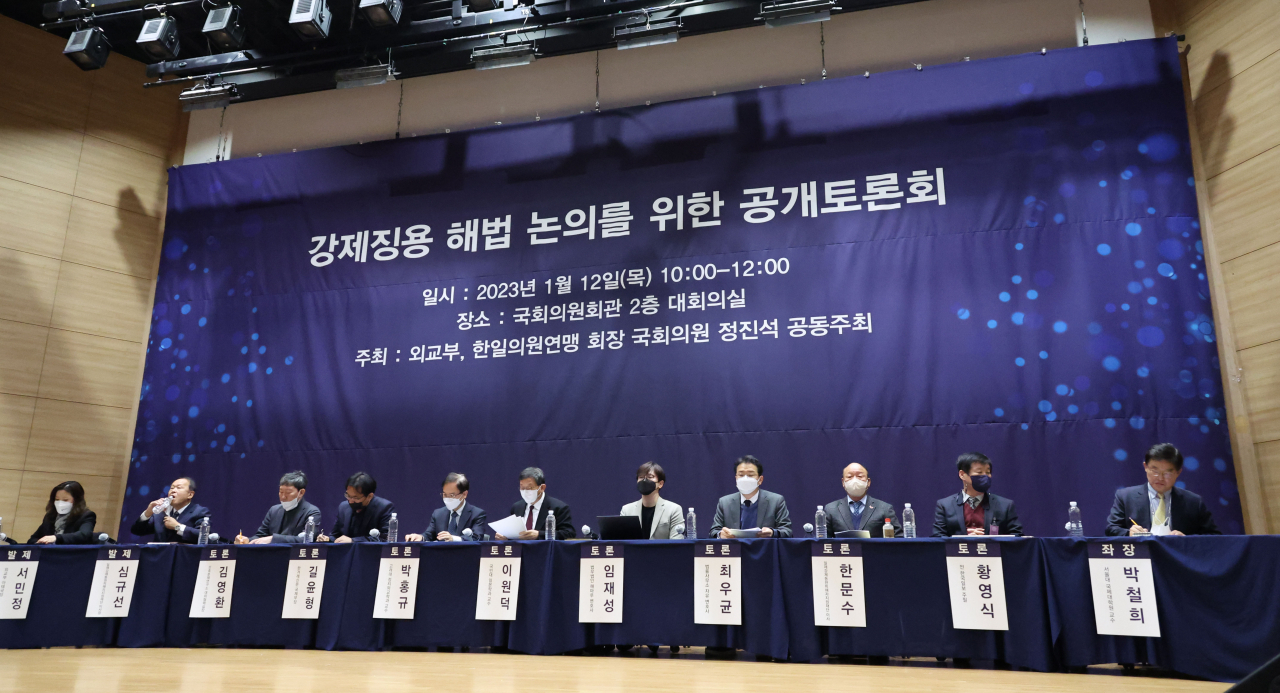State-run body to start fleshing out compromise on forced labor
By Choi Si-youngPublished : Jan. 17, 2023 - 16:03

South Korea’s state-run foundation established to help Koreans forced into labor by Japanese companies during World War II is preparing to reach out to Korean companies as early as next week to compensate the victims, sources said Tuesday, as part of a compromise deal Seoul believes will help settle the longtime historical dispute with Tokyo.
Last week, the Korean government essentially endorsed a plan to have the Korean government or companies compensate the victims while awaiting Japan’s “sincere response.” Tokyo has refused to recognize Seoul’s top court ruling in 2018 that held Japanese firms liable for damages. The 1965 treaty, which normalized their ties, is what Japan cites as grounds for calling the issue resolved and refusing to give an apology and compensation -- the two things the victims have long sought.
A senior official at the Foundation for Victims of Forced Mobilization by Imperial Japan said the group will discuss the compensation plan with the Korean companies that benefited economically from the 1965 treaty. The pact, which took place to reset ties following Japan’s 1910-1954 occupation of the Korean Peninsula, led to $800 million in economic aid for South Korea. It was used to grow companies and build infrastructure.
South Korean steel giant Posco -- one of the 16 local companies that benefited from the aid -- pledged to donate 10 billion won ($8 million) in 2012, but has so far delivered 6 billion won. The remaining fund, combined with donations from other companies, would be used to compensate the victims, the foundation official said, noting that 14 victims with top court rulings in their favor would be the first recipients. Their total damages currently amount to 3.4 billion won.
Victims still battling their way to the Supreme Court will also be given compensation from the foundation, Seoul’s Foreign Ministry said at a briefing held the same day to update lawmakers on the issue.
A total of 67 cases brought by forced labor victims are still pending a final decision by the top court, the ministry said, adding that efforts to remind the public of rights abuses would take place in stages. The ministry did not elaborate whether such work would involve Japan, which has repeatedly denied its involvement in forced labor.
Still, critics call the compromise deal a “half-hearted” measure that falls far short of reaching a middle ground on the issue. This is because neither the Japanese government nor the firms found liable for damages by the Korean courts are playing any role in compensating the victims, they said.
Lim Jae-sung, the attorney who won the case for Korean victims in the 2018 Supreme Court ruling, told reporters last week following a public debate that the Korean government was making a rushed decision that it clearly knows the victims “would not swallow.” The attorney demanded the government hold more public hearings so Japan shoulders a bigger responsibility than what is being currently discussed.


![[AtoZ into Korean mind] Humor in Korea: Navigating the line between what's funny and not](http://res.heraldm.com/phpwas/restmb_idxmake.php?idx=644&simg=/content/image/2024/04/22/20240422050642_0.jpg&u=)

![[Exclusive] Korean military set to ban iPhones over 'security' concerns](http://res.heraldm.com/phpwas/restmb_idxmake.php?idx=644&simg=/content/image/2024/04/23/20240423050599_0.jpg&u=20240423183955)

![[Herald Interview] Why Toss invited hackers to penetrate its system](http://res.heraldm.com/phpwas/restmb_idxmake.php?idx=644&simg=/content/image/2024/04/22/20240422050569_0.jpg&u=20240422150649)
![[Graphic News] 77% of young Koreans still financially dependent](http://res.heraldm.com/phpwas/restmb_idxmake.php?idx=644&simg=/content/image/2024/04/22/20240422050762_0.gif&u=)







![[Exclusive] Korean military to ban iPhones over security issues](http://res.heraldm.com/phpwas/restmb_idxmake.php?idx=652&simg=/content/image/2024/04/23/20240423050599_0.jpg&u=20240423183955)



![[Today’s K-pop] Ateez confirms US tour details](http://res.heraldm.com/phpwas/restmb_idxmake.php?idx=642&simg=/content/image/2024/04/23/20240423050700_0.jpg&u=)